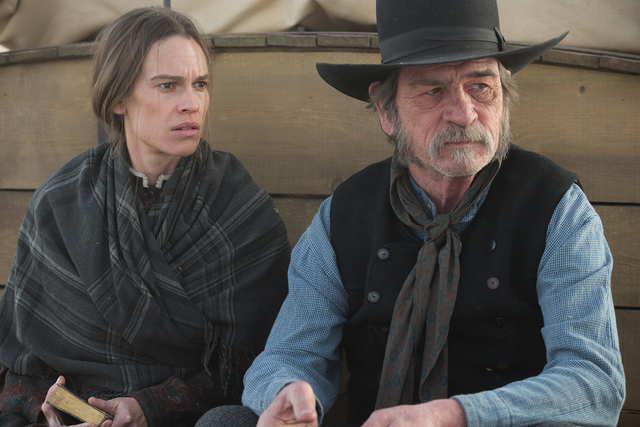‘The Homesman’ lays to rest any Wild West aging notions

If any romanticized notions of frontier life survived this summer’s “A Million Ways to Die in the West,” they die with their boots on in “The Homesman.”
As depicted, the Nebraska Territory in 1855 was a terrible place for women. One tosses her dead children out the door like so much garbage. Another pitches her crying baby down the pit of an outhouse. A third grows so insane, she repeatedly stabs her bare flesh with a sewing needle. And one has sex with Tommy Lee Jones.
Each act is increasingly horrible to watch.
Based on the novel by Glendon Swarthout, whose book-to-movie tales range from “The Shootist” to “Where the Boys Are,” “The Homesman” turns Jones loose in the era into which he should have been born. The actor not only stars, he directs and co-writes, along with Kieran Fitzgerald and Wesley A. Oliver.
Jones earned a good deal of acclaim for his feature directing debut, “The Three Burials of Melquiades Estrada.” Think of this as “The Three Crazy Women of George Briggs.”
Briggs (Jones) is a reprobate claim jumper, strung up in his longjohns, whimpering and hoping against hope his horse doesn’t spook and leave him to hang. He’s barely holding on when he’s rescued by Mary Bee Cuddy (Hilary Swank), a successful, single homesteader on a mission.
She’s volunteered to deliver three local women, driven mad by the harshness and isolation of the terrain, to the safety of a preacher’s wife in Iowa, where they’ll get the treatment they need. But Mary Bee needs a little help from Briggs to get them there in the donated wagon — part transport, part prison — pulled by mules she’s named Grace and Redemption.
Mary Bee is quite the character. She’s doing just fine on her own, tending her crops and living comfortably. She’s even saving up to purchase the region’s first melodeon. But at 31, she’s practically a spinster.
She entertains a neighbor (Evan Jones) with a home-cooked meal, splurging on a pie made from peaches that came in a can. Mary Bee is clearly way too good for him, but when she suggests they marry, he refuses, citing her bossiness and plainness. Briggs eventually echoes the latter sentiment, declaring her “plain as an old tin pail.” Mary Bee, though, is so insecure, so desperate to wed, when she declares her love for the trees that remind her of her home back East, you half expect her to follow it with a plaintive, “Trees, will you marry me?”
Jones has assembled a tremendous cast, although aside from himself, only Swank settles in for the long haul. John Lithgow sticks around for a few scenes as the reverend in charge of the settlement. Meryl Streep pops up for a moment or two as that Iowa preacher’s wife. James Spader moseys in as a hotelier. “True Grit” Oscar nominee Hailee Steinfeld sits for a spell. And Tim Blake Nelson rides in just long enough to try to rape one of the women and fight in the dirt with Briggs.
It’s as if each of them owed Jones a favor, but could only spare an hour or two.
The human cargo, though, feels less like real people than a barely verbal collection of tics and eccentricities. After losing three babies to diphtheria in a matter of days, Arabella (Streep’s daughter, Grace Gummer) spends her time obsessively caring for a doll. Subjected by her husband (David Dencik) to countless acts of less-than-consensual sex, Gro (Sonja Richter) has become so psychotic, her head might as well spin around as she wails and declares to everyone she meets, “God will strike you down!” And Theoline (Miranda Otto), well, whatever made her nuts is glossed over. But the three of them make for an unholy sight, pulling their hair and bashing their skulls against the wagon’s wheels, to which they’re tied each night.
Jones, however, is having a grand old time, singing, dancing and laying on that cantankerous, half-drunk thing he does so well.
“The Homesman” is an odd, unrelentingly grim look at a largely unexplored subject, but its last 15 minutes or so are a bit of a mess. And there really are few words that can describe just how unsettling those sex scenes are. The Western could be marketed horror-movie-style, with night-vision footage of audience members recoiling and hiding their eyes.
At one point, Lithgow’s reverend says of the women, “Life gave them more than they can bear.”
Jones may have done the same to moviegoers.
Contact Christopher Lawrence at clawrence@reviewjournal.com or 702-380-4567.